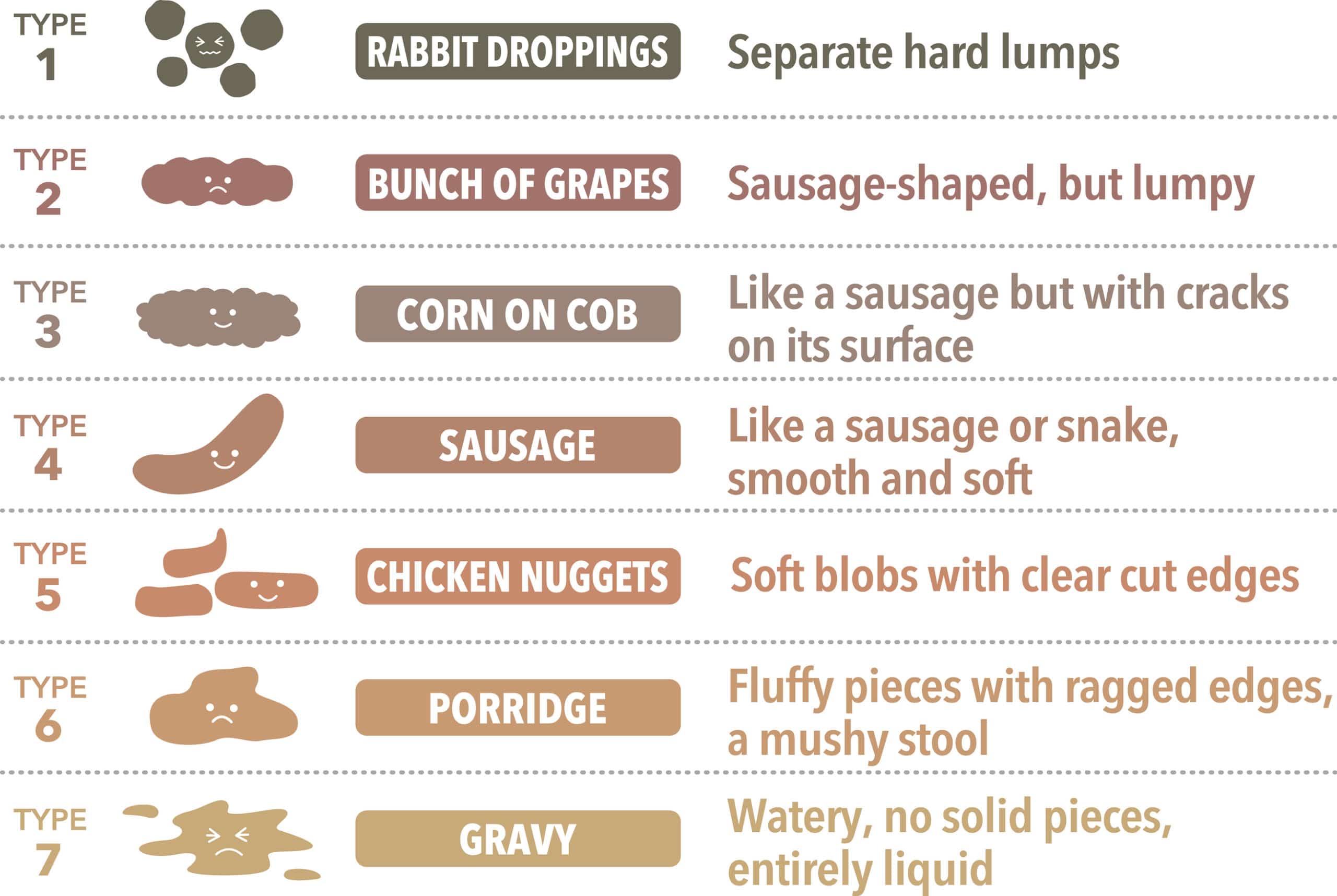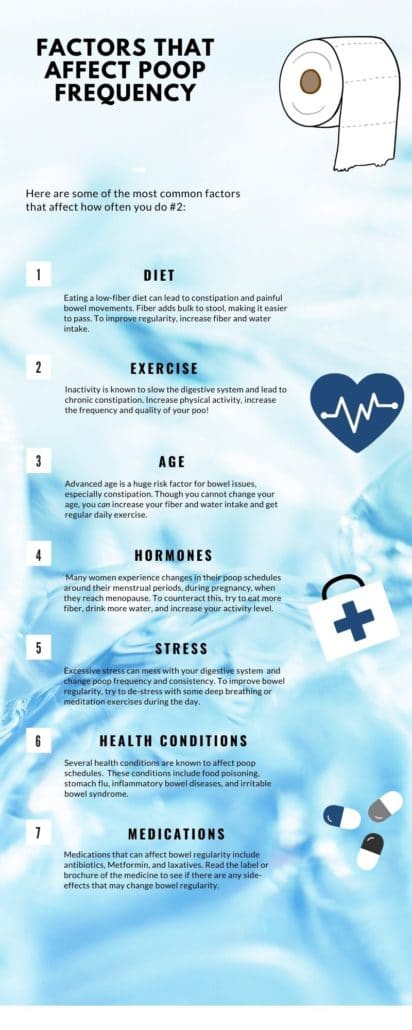How often should you poop?
Click Here For Transcript of "How often should you poop?" Video
Help I’m sitting, and I can’t poop!
Poo Doctor here, and this is what you need to know if you can’t go!
If you’re pooping less than 3 times a week, then you have a medical condition.
You’re constipated!
This could be due to dangerous blockages or nerve issues in and around your rectum or colon.
Or even pregnancy or diabetes could be the culprit.
Or for you and your poo, it might be something else entirely.
Click below for the poo doctor “prescribed” 10-second breakfast ritual that frees YOU from stuck POO! Until next time, Like for good poop. Subscribe for great poop!
If you’ve been wondering how often should you poop, you’re not alone. Poo doctor is here to answer all of your questions!
It’s a topic that many may find a bit uncomfortable to discuss, yet it’s undeniably a question that piques our curiosity: How often should you poop? While the frequency of bowel movements can vary widely from person to person, understanding what’s normal, aka healthy bowel movements, can be an essential part of monitoring your health.
The conversation about bowel movement frequency isn’t merely about solving a bodily mystery; it’s about gaining insights into the optimal functioning of our digestive systems.
Every person’s body operates on its own unique rhythm, and the same goes for their digestive tract. Some might need to head to the bathroom several times a day, while others might only need to go a few times a week. This variety reminds us of the complex interplay between diet, lifestyle, and overall health that determines our digestive regularity.
If you’ve ever wondered whether your bathroom habits are normal or if there might be room for a digestive tune-up, you’re not alone. Stay tuned for an exploration of what influences these patterns and how to tell if your system is running like clockwork.
Don’t hesitate to share this with friends and family on social media or via email—it might answer some of their questions, too! Let’s open up the conversation and clarify this hush-hush topic.
Factors Influencing Poop Frequency
Understanding how often you should go to the bathroom and whether you’re having a normal bowel movement isn’t just about comfort but health. Several factors can influence how frequently you poop, and recognizing these can help you better understand your body’s needs and whether your digestive system is functioning optimally.
From what you eat to how you manage stress, each element plays a significant role in dictating the regularity of your bowel movements.
1. Diet and Fluid Intake
The types of food you consume profoundly impact your bowel movements. Diets rich in fruits and vegetables provide fiber, which helps form the bulk of the stool and stimulates the intestines to push waste through so that you have normal bowel movements. However, consuming too much fiber can result in chronic diarrhea.
Conversely, consuming a lot of processed foods, which are typically low in fiber, can lead to harder stools and less frequent bowel movements, often resulting in chronic constipation.
Fluid intake is equally important; water helps keep the digestive system running smoothly by softening stools and aiding fiber’s function. A lack of adequate fluids often results in harder stools that are difficult to pass.
2. Exercise
Physical activity plays a crucial role in maintaining regular bowel movements and having a healthy poop. Exercise helps increase blood flow and stimulates the muscles in the intestines, aiding the process of moving stools through the colon. Regular physical activity can help prevent constipation and promote regularity.
Conversely, a sedentary lifestyle can decrease bowel motility and lead to irregular bowel movements, making exercise a critical component of digestive health.
3. Stress Levels
Stress can significantly impact digestive health. High-stress levels can lead to disruptions in the gastrointestinal system, often slowing down or speeding up the digestive process unexpectedly. Chronic stress can alter the brain-gut interaction, leading to symptoms like diarrhea or constipation.
Managing stress through methods such as mindfulness, meditation, or regular physical activity can, therefore, improve not only mental health but also bowel regularity.
4. Age
As you age, changes in the digestive system can affect bowel movement frequency. Muscle tone decreases with age, including the muscles in the digestive tract, which can slow the movement of stool through the colon.
Additionally, older adults often experience changes in diet and physical activity levels and may use more medications, all of which can impact bowel regularity.
5. Medication Usage
Many medications can influence stool frequency. Certain painkillers, antidepressants, and iron supplements can lead to constipation. Conversely, some drugs, like antibiotics, can cause diarrhea by affecting the balance of bacteria in the gut.
It’s important to discuss potential side effects with a healthcare provider and find ways to mitigate these effects to maintain regular bowel movements.
6. Gut Health
The health of your gut flora plays a crucial role in how often you poop. A balanced microbiome aids in digestion and helps regulate bowel movements. An imbalance, on the other hand, can lead to issues such as diarrhea or constipation.
Probiotics can sometimes help restore this balance and promote regularity, but it’s essential to choose the right type based on specific needs.
7. Medical Conditions
Several chronic conditions can affect how frequently you need to use the restroom. A digestive disorder like Irritable Bowel Syndrome (IBS), Crohn’s disease, and thyroid problems can all cause changes in bowel habits.
To maintain a balanced digestive system, it’s crucial to manage these conditions with the guidance of a healthcare professional.
By understanding these factors, you can better manage your digestive health and make informed decisions that enhance your overall well-being. Knowing what impacts your bowel movements allows you to adjust your lifestyle to support digestive regularity and health.
When to Consult a Doctor About Poop Frequency
While variations in poop frequency are generally normal, certain signs may indicate the need for medical consultation.
It’s important to recognize when changes in bowel habits suggest potential underlying health issues that require professional attention.
Here are some key reasons you might need to discuss your bowel frequency with a doctor:
1. Sudden Changes in Frequency
If you experience sudden and persistent changes in how often you poop, whether it’s an increase or decrease, it could be a sign of an underlying health condition.
Such changes, especially if they are not linked to recent changes in diet or lifestyle, warrant a visit to your healthcare provider.
2. Presence of Blood
Finding blood in your stool is a significant reason to see a doctor. Blood can appear bright red or as a darker, tar-like substance in the stool.
This could indicate conditions ranging from hemorrhoids to more severe issues like inflammatory bowel disease or colon cancer.
3. Severe Discomfort
If bowel movements are consistently painful or if you experience severe abdominal pain, it’s essential to consult a doctor.
Discomfort that persists or is intense can indicate blockages, severe constipation, or other serious digestive issues.
4. Accompanying Symptoms
If changes in bowel habits are accompanied by other symptoms, such as unexplained weight loss, fatigue, or changes in appetite, you should see a healthcare professional.
These symptoms, combined with altered poop frequency, can point to a variety of medical conditions that require diagnosis and treatment.
5. Ineffectiveness of Home Remedies
If you’ve tried adjusting your diet, increasing fluid intake, or adding exercise to your routine and your bowel habits have not improved, this might indicate a need for medical evaluation.
Persistent constipation or diarrhea despite home management can suggest deeper gastrointestinal issues.
Understanding when to seek medical advice is crucial to maintaining digestive health and overall well-being. If any of these signs are present, seek medical attention for proper testing and treatment.
FAQ: Insights into Lower Colon Health
Maintaining the health of the lower colon is crucial for effective digestion and overall well-being. Here are some frequently asked questions that delve into important aspects of lower colon health, providing a clearer understanding and guidance on maintaining this critical part of the digestive system.
1. What is the primary function of the lower colon?
The lower colon, which includes the descending and sigmoid colons, is crucial in absorbing water and electrolytes from digested food. This process helps form solid waste, or stool, from what remains after digestion.
Additionally, the lower colon stores fecal material until it is expelled from the body, playing a significant role in regulating bowel movement patterns.
2. What are common signs that might indicate a problem with bowel health, aka the lower colon?
Signs that may suggest a health issue with the lower colon include changes in bowel movement patterns such as increased frequency of diarrhea or constipation, persistent abdominal pain or discomfort, bloating, and the presence of blood or mucus in the stool.
These symptoms can indicate conditions ranging from benign issues like hemorrhoids to more serious conditions such as inflammatory bowel diseases or cancer.
3. How can diet affect the health of the lower colon?
Diet has a significant impact on lower colon health. High-fiber foods help promote regular bowel movements and prevent constipation by adding bulk to the stool and facilitating its passage through the colon.
Conversely, a diet low in fiber and high in processed and fatty foods can lead to constipation and increased strain during bowel movements, which can cause issues such as diverticulosis or exacerbate conditions like irritable bowel syndrome (IBS).
4. What lifestyle changes can improve lower colon health?
Regular physical activity can significantly benefit the lower colon by enhancing muscular contractions that help move stool through the colon. Staying hydrated by drinking plenty of water also helps keep the stool soft and easier to pass.
Additionally, managing stress effectively is essential, as stress can negatively impact colon health by altering hormonal and nervous system responses that affect digestive functions.
5. When should someone seek medical advice regarding their lower colon health?
It is advisable to seek medical attention if you are experiencing symptoms such as persistent or severe abdominal pain, blood in the stool, unexplained changes in bowel habits, or significant unexplained weight loss. These could be signs of severe conditions that require prompt medical evaluation and treatment.
Regular screenings, such as colonoscopies, are also recommended after the age of 45 or earlier if there is a family history of colon cancer or other risk factors.
Understanding and addressing these aspects of lower colon health can help prevent complications and improve your quality of life. Proactive management and regular check-ups are vital to maintaining a healthy digestive system.
Conclusion: Understanding Your Body’s Natural Rhythm
Gaining insight into how often you should poop offers a glimpse into your digestive health and overall wellness. This natural process varies from person to person and is influenced by many factors, from diet to lifestyle.
If you’ve found this discussion enlightening, why not share the knowledge? This topic touches everyone’s life and can foster healthier habits among your friends and family. Spread the word through social media or a thoughtful email—it’s a conversation starter that’s not only intriguing but also essential for well-being. Let’s keep the dialogue open and learn from each other!
Types of poop one encounters is categorized by the Bristol Stool Chart. This chart is a generalized indicator of how or why different types of poops look and feel a certain way. The 7 types of poop are broken up into categories based on a 2,000-person study!

Does your poo look this good? If you have Bristol Type 3 or 4 – your poop is considered “normal”! Bristol Type 1 or 2, is where the poop is hard and difficult to pass, are indicative of constipation. Often, these types of stool can be painful to pass – but don’t worry – Doctor Poo has a recommended healthy-gut switch solution…just keep reading!
Should you ever worry about your poop?
Always consult your healthcare provider if you have any concerns about what your poop means. People are asked to call their healthcare providers if: They experience severe levels of abdominal pain or discomfort with diarrhea that does not go away when they poop or fart. Also, if diarrhea is accompanied by a fever of 101 degrees Fahrenheit or higher, chills, vomiting, or fainting, call your physician immediately.
What is unhealthy poop?
An unhealthy poop is when one poops too often (hence, your doctor asking you if you poop more than three times daily) or not poops often enough (As such, less than three times a week) and also excessive straining when pooping. Poop that is colored red, black, green, yellow, or white. greasy or fatty stools are unhealthy.
Help fix so many of your digestive and bathroom issues, such as gas and bloating, and improve your overall health with this patented molecule that is backed by Ivy League Doctors by clicking here!
Doctor Poo Provides More Valuable Answers for Those Hard to Ask Questions Below:














Trackbacks & Pingbacks
[…] An unhealthy poop is when one poops too often (hence, your doctor asking you if you poop more than t… […]
[…] source:sanesolution.com size:1280px x720px […]
[…] post How often should you poop? appeared first on SANESolution | Proven & Powerful […]
[…] post How often should you poop? appeared first on SANESolution | Proven & Powerful […]
Comments are closed.